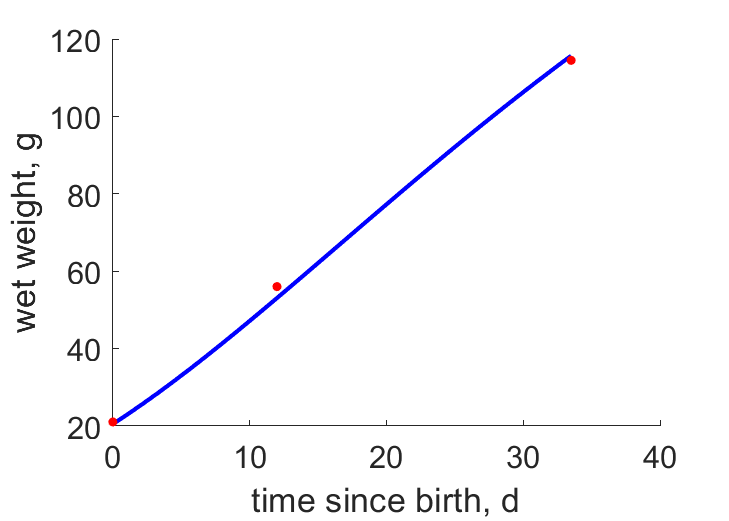Predictions & Data for this entry
| Model: std | climate: Dfa, Dfb, Dfc | migrate: Ml | phylum: |
| COMPLETE = 2.5 | ecozone: THn | food: biCi | class: |
| MRE = 0.023 | habitat: 0iTg, 0iTh, 0iFm | gender: Dg | order: |
| SMSE = 0.001 | embryo: Tnsfm | reprod: O | family: |
Zero-variate data
| Data | Observed | Predicted | (RE) | Unit | Description | Reference |
|---|---|---|---|---|---|---|
| ab | 23 | 22.76 | (0.01051) | d | age at birth | avibase |
| tx | 30.5 | 30.48 | (0.0004941) | d | time since birth at fledging | avibase |
| tp | 91.5 | 99.23 | (0.08444) | d | time since birth at puberty | guess |
| tR | 365 | 365 | ( 0) | d | time since birth at 1st brood | guess |
| am | 3285 | 3312 | (0.008094) | d | life span | avibase |
| Ww0 | 23.5 | 28.75 | (0.2232) | g | initial wet weight | avibase |
| Wwb | 18 | 18.84 | (0.04678) | g | wet weight at birth | avibase |
| Wwi | 168.2 | 163.2 | (0.03021) | g | ultimate wet weight | avibase |
| Wwim | 148.5 | 148.2 | (0.001788) | g | ultimate wet weight of male | avibase |
| Ri | 0.01096 | 0.01119 | (0.02092) | #/d | maximum reprod rate | avibase |
Uni- and bivariate data
| Data | Figure | Independent variable | Dependent variable | (RE) | Reference |
|---|---|---|---|---|---|
| tW |  | time since birth | wet weight | (0.02438) | HousJack2020 |
Pseudo-data at Tref = 20°C
| Data | Generalised animal | Bartramia longicauda | Unit | Description |
|---|---|---|---|---|
| v | 0.02 | 0.03992 | cm/d | energy conductance |
| p_M | 18 | 540.5 | J/d.cm^3 | vol-spec som maint |
| k_J | 0.002 | 0.02185 | 1/d | maturity maint rate coefficient |
| k | 0.3 | 0.2962 | - | maintenance ratio |
| kap | 0.8 | 0.7137 | - | allocation fraction to soma |
| kap_G | 0.8 | 0.7995 | - | growth efficiency |
| kap_R | 0.95 | 0.95 | - | reproduction efficiency |
Discussion
- Males are assumed to differ from females by {p_Am} only
- mod_1: Pseudo-data point k is used, rather than k_J; Data set tp and parameter t_R are added, the latter replacing clutch interval t_N. Postnatal T is based on PrinPres1991, see get_T_Aves. See further the revision page, theme puberty
Bibliography